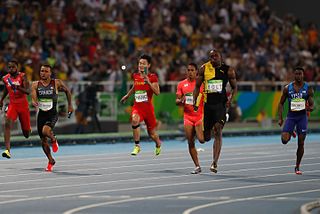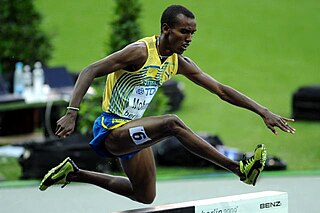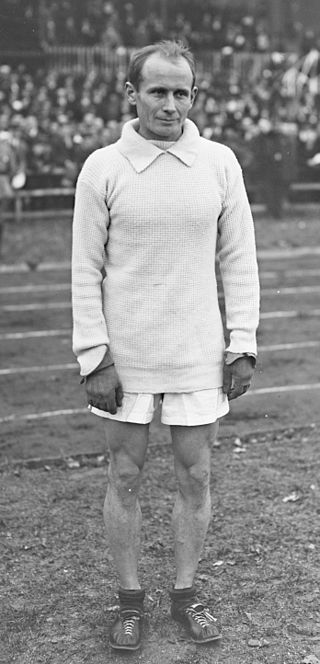
The 1912 Summer Olympics, officially known as the Games of the V Olympiad and commonly known as Stockholm 1912, were an international multi-sport event held in Stockholm, Sweden, between 6 July and 22 July 1912. The opening ceremony was held on 6 July.

Meseret Defar Tola is an Ethiopian long-distance runner who competes chiefly in the 3,000 metres and 5,000 metres events. She has won medals at top-tier international competitions including Olympic and World Championship gold medals over 5,000 metres. She broke the world record in the event in 2006, broke it again in 2007 and held it until 2008, when fellow Ethiopian Tirunesh Dibaba beat her time.

The 4 × 100 metres relay or sprint relay is an athletics track event run in lanes over one lap of the track with four runners completing 100 metres each. The first runners must begin in the same stagger as for the individual 400 m race. Each runner carries a relay baton. Before 2018, the baton had to be passed within a 20 m changeover box, preceded by a 10-metre acceleration zone. With a rule change effective November 1, 2017, that zone was modified to include the acceleration zone as part of the passing zone, making the entire zone 30 metres in length. The outgoing runner cannot touch the baton until it has entered the zone, and the incoming runner cannot touch it after it has left the zone. The zone is usually marked in yellow, frequently using lines, triangles or chevrons. While the rule book specifies the exact positioning of the marks, the colours and style are only "recommended". While most legacy tracks will still have the older markings, the rule change still uses existing marks. Not all governing body jurisdictions have adopted the rule change.

Mustafa Hassan Mohamed is a Swedish long-distance runner who mainly competes in the 3000 meter steeplechase.

Augustine Kiprono Choge is a Kenyan middle distance and long distance runner.

The men's 400 metres was a track and field athletics event held as part of the Athletics at the 1912 Summer Olympics programme. The competition was held on Friday, July 12, 1912, and on Saturday, July 13, 1912. Forty-nine runners from 16 nations competed. NOCs could enter up to 12 athletes. The event was won by Charles Reidpath of the United States, the nation's fourth title in the event. Hanns Braun of Germany took silver, the nation's first medal in the men's 400 metres.

The men's 1500 metres was a track and field athletics event held as part of the athletics at the 1912 Summer Olympics programme. The competition was held on Tuesday, July 9, 1912, and on Wednesday, July 10, 1912. Forty-five runners from 14 nations competed, including the Olympic champion from 1908, Mel Sheppard. NOCs could enter up to 12 athletes.

Norway competed at the 1912 Summer Olympics in Stockholm, Sweden. 190 competitors, 188 men and 2 women, took part in 58 events in 14 sports.

Germany competed at the 1912 Summer Olympics in Stockholm, Sweden. 185 competitors, 180 men and 5 women, took part in 69 events in 14 sports. Due to the political fallout from World War I, this was the country's last appearance until 1928.

The men's 4 × 100 meters relay was a track and field athletics event held as part of the Athletics at the 1912 Summer Olympics program. It was the debut of the event, which along with the 4 × 400-meter relays marked the first relays of equal legs in the athletics program. The competition was held on Monday, July 8, 1912, and on Tuesday, July 9, 1912. NOCs could enter 1 team of 4 athletes, with up to 2 reserves.

The men's marathon event was part of the track and field athletics programme at the 1920 Summer Olympics. The distance of this race was 42.75 kilometres. The competition was held on Sunday, 22 August 1920. 48 runners from 17 nations competed. No nation had more than 4 runners, suggesting the limit had been reduced from the 12 maximum in force in 1908 and 1912. The event was won by Hannes Kolehmainen of Finland, the nation's first Olympic marathon medal and victory; Kolehmainen received his fourth gold medal, having won the 5000 metres, 10,000 metres, and individual cross country in 1912. Estonia and Italy also won their first marathon medals.
The men's 3000 metres team event was part of the track and field athletics programme at the 1920 Summer Olympics. It was the second appearance of a 3000-metre team race event after the debut in 1912, but the fifth time that a team contest was arranged at the Olympics. The competition was held on Saturday, August 21, 1920, and on Sunday, August 22, 1920. 31 runners from six nations competed.

Genzebe Dibaba Keneni is an Ethiopian middle- and long-distance runner. A 1,500 metres 2016 Rio Olympics silver medalist, she won a gold medal in this event and a bronze in the 5,000 metres at the 2015 World Championships. Genzebe is the current world record holder for the indoor events of the one mile, 3,000m and 5,000m.

Mahiedine Mekhissi-Benabbad is a retired French professional middle-distance runner of Algerian descent who mainly competed in the 3000 metres steeplechase. He is the only man to win three Olympic steeplechase medals, claiming silver in 2008 and 2012 and bronze in 2016. He also won two bronze medals at the IAAF World Championships in Athletics in 2011 and 2013. Mekhissi-Benabbad earned titles at five consecutive editions of the European Athletics Championships between 2010 and 2018.

Habiba Ghribi is a Tunisian middle- and long-distance runner who specialises in the 3000 metres steeplechase. She won the gold medal at the 2012 Summer Olympics, giving her country its first Olympic medal by a woman. She is also the Tunisian record holder in the event, having run 9:05.36 at the Memorial van Damme in Brussels in September 2015.
Annette Sergent is a French former long-distance runner. She represented her country three times at the Summer Olympics, but it was in cross country running that she had her greatest success. She became the first Frenchwoman to win a world title in the sport at the 1987 IAAF World Cross Country Championships and won for a second time in 1989. In addition to these victories, she made eleven appearances at the competition and placed third in both 1986 and 1988.
The 4 × 100 metres relay at the Summer Olympics is the shortest track relay event held at the multi-sport event. The men's relay has been present on the Olympic athletics programme since 1912 and the women's event has been continuously held since the 1928 Olympic Games in Amsterdam. It is the most prestigious 4×100 m relay race at elite level.

Combined events at the Summer Olympics have been contested in several formats at the multi-sport event. There are two combined track and field events in the current Olympic athletics programme: a men's decathlon and a women's heptathlon.

Yomif Kejelcha Atomsa is an Ethiopian distance runner. He holds the current world record in the short track mile, and the half marathon.

Courtney Frerichs is an American middle-distance runner and steeplechase specialist from Nixa, Missouri, She is a three-time silver medalist in the 3000 meters steeplechase capturing silver at the 2020 Tokyo Olympic Games, the 2017 World Championships in London and at the 2018 World (Continental) Cup in Ostrava. In 2021, she became the first American woman to run under nine-minutes in a women’s 3000-meters steeplechase event with a time of 8:57.77; establishing an American and Area record. She is a two-time Olympian making the US team in 2016 and 2020. In both of her Olympic Trials she finished second to US National Champion, Emma Coburn.



















